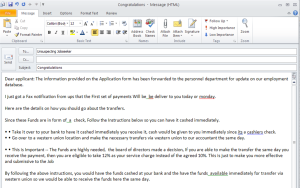 Recently, the Workforce Center in Panama City, Florida reported an incident where an impostor posted a position on the Employ Florida Marketplace. When jobseekers responded to the ad, they were asked to send money in advance for “required training for the job.”
Recently, the Workforce Center in Panama City, Florida reported an incident where an impostor posted a position on the Employ Florida Marketplace. When jobseekers responded to the ad, they were asked to send money in advance for “required training for the job.”
In this case, the company was also a victim; a legitimate company registration was used for the phony job posting.
According to the scam site thats nonsense.com, fake Job offers typically fall into three different categories of scams – advanced fee fraud, money mule scams and check cashing scams, and sometimes a combination. The point of fake job offers is usually identity theft or money laundering.
WorkSource reminds you that it can be difficult to determine when a listing is simply a scam. Here are some warning signs that should alert you:
- Emails that do not come from a company URL (ABC Bank at gmail.com, for example)
- Misspellings, grammatical mistakes, or weird syntax in the message (“the company can be offering you as best salary…”)
- An employer offering employment without an interview
- An employer who charges a fee to employ, find placement, or provide training prior to an official job offer; likewise, an employer that offers to send you a check that you cash in advance of employment.
- Employers who make exaggerated claims of earnings or profits
- Any employer requesting that you transfer funds or receive packages for reshipment, especially if they are located overseas
Here are some tips to keep you from falling prey to scammers:
- Look up the company; if you can’t find it in a Google search, you should be cautious.
- If the message makes you suspicious, paste the text of the email into a search engine. You may find sites that warn you against the scam.
- Do not provide your social security number or any other sensitive information to an employer unless you are confident that the employer is legitimate
- Be wary when replying to unsolicited emails for work-at-home employment
- Be cautious of employers who conduct their interviews in a home setting or in motel rooms
- If there is a link in the email, hover your cursor over it (but do NOT click it.) This often reveals that the real location the link will take you is a phishing website.
Have you received any of these fake job offers? Leave a comment and let us know.

